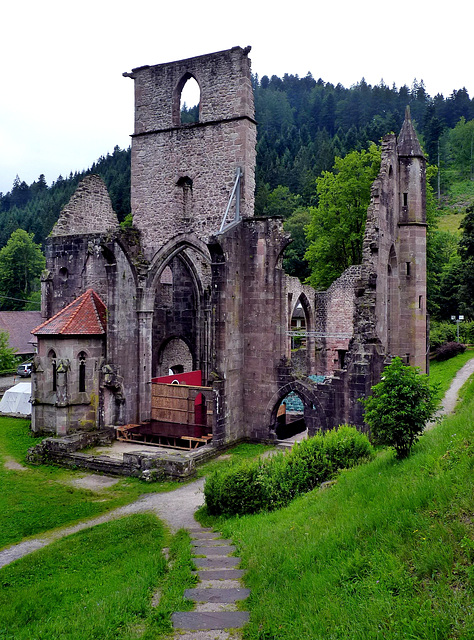Oppenau - Kloster Allerheiligen
Glottertal - St. Blasien
Freiburg - Muenster
Freiburg - Muenster
Freiburg - Muenster
Freiburg - Muenster
Breisach - Muenster St. Stephanus
Schwarzach - Saints Peter and Paul
Schwarzach - Saints Peter and Paul
Schwarzach - Saints Peter and Paul
Schwarzach - Saints Peter and Paul
St. Peter - St. Peter
St. Peter - St. Peter
Basel - Muenster
Basel - Muenster
Basel - Muenster
Basel - Muenster
Basel - Muenster
Basel - Muenster
Basel - Muenster
Basel - Muenster
Basel - Muenster
Basel - Muenster
Mummelsee
Heselbach - St. Peter
Heselbach - St. Peter
Klosterreichenbach - Monastery
Klosterreichenbach - Monastery
Klosterreichenbach - Monastery
Klosterreichenbach - Monastery
Klosterreichenbach - Monastery
Klosterreichenbach - Monastery
Klosterreichenbach - Monastery
Herrenalb - Abbey
Hirsau - Abbey
Hirsau - Abbey
Hirsau - Abbey
Hirsau - Abbey
Hirsau - Abbey
Hirsau - Abbey
Hirsau - Abbey
Hirsau - Abbey
Hirsau - St. Aurelius
Hirsau - St. Aurelius
Hirsau - St. Aurelius
Location
See also...
Keywords
Authorizations, license
-
Visible by: Everyone -
All rights reserved
-
133 visits
Oppenau - Kloster Allerheiligen


Kloster Allerheiligen ("All Saints' Abbey") was a Premonstratensian monastery founded in 1192 by the regional nobilty. It had a long history as an abbey, even survived the Reformation, but in 1802 Margrave Karl Friedrich of Baden dissolved the abbey and took its possessions. All monks had to leave, and after a factory, that had been established here, failed, the whole complex fell into ruins and got sold as a quarry.
Meanwhile, British aristocracy had invented tourism, sailed the Rhine up and down and climbed onto swiss mountains. The Romantic Period started in Germany and painters like Caspar David Friedrich made "lonely ruins in fog" a theme of many works of art. Printer Karl Baedeker opened a publishing house in Koblenz. The title of his first bestseller was "Rheinreise von Mainz bis Koeln" ("Travelling the Rhine from Mainz to Cologne"). From then on Mr. Baedecker focussed very sucessfully on guidebooks.
First tourists hiked up the valley to see the ruins and about 1840 a guesthouse was opened, to offer beer and limonade... In 1853 Mr. Baedecker himself visited the place - and wrote about the romantic ruins and the wonderful waterfalls nearby.
In 1871 the guesthouse got rebuilt into a posh hotel. Samuel Langhorne Clemens (aka "Mark Twain"), traveling through Europe, probably read Baedecker´s guidebook and so visited the ruins in 1878. He wrote about it in "A Tramp Abroad" (part of this book is the essay "The Awful German Language").
Today the place seems a little forgotten again, though as in so many ruins and as in front of so many Romanesque churches - during summer there is a stage here.
Meanwhile, British aristocracy had invented tourism, sailed the Rhine up and down and climbed onto swiss mountains. The Romantic Period started in Germany and painters like Caspar David Friedrich made "lonely ruins in fog" a theme of many works of art. Printer Karl Baedeker opened a publishing house in Koblenz. The title of his first bestseller was "Rheinreise von Mainz bis Koeln" ("Travelling the Rhine from Mainz to Cologne"). From then on Mr. Baedecker focussed very sucessfully on guidebooks.
First tourists hiked up the valley to see the ruins and about 1840 a guesthouse was opened, to offer beer and limonade... In 1853 Mr. Baedecker himself visited the place - and wrote about the romantic ruins and the wonderful waterfalls nearby.
In 1871 the guesthouse got rebuilt into a posh hotel. Samuel Langhorne Clemens (aka "Mark Twain"), traveling through Europe, probably read Baedecker´s guidebook and so visited the ruins in 1878. He wrote about it in "A Tramp Abroad" (part of this book is the essay "The Awful German Language").
Today the place seems a little forgotten again, though as in so many ruins and as in front of so many Romanesque churches - during summer there is a stage here.
- Keyboard shortcuts:
Jump to top
RSS feed- Latest comments - Subscribe to the comment feeds of this photo
- ipernity © 2007-2024
- Help & Contact
|
Club news
|
About ipernity
|
History |
ipernity Club & Prices |
Guide of good conduct
Donate | Group guidelines | Privacy policy | Terms of use | Statutes | In memoria -
Facebook
Twitter

Sign-in to write a comment.